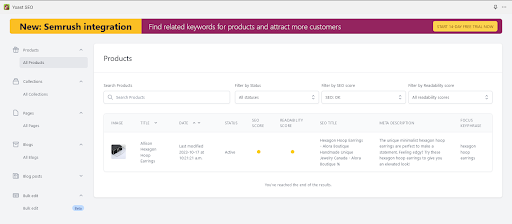Can AI Search the Internet? Search Engines, AI Assistants, and Tips for Optimization
AI is built on vast amounts of data. Discover how different AI tools retrieve information and how you can use them to optimize your on-site experience.
Updated November 19, 2024.

AI has exploded everywhere—from chatbots to photo apps, text generators, and more. A major challenge for AI models like ChatGPT was accessing real-time internet data that not only made searches difficult but also raised questions about eCommerce data reliability.
Today, AI can search the internet, often in real time, but not in the way Google does. Let's take a look at how AI tackles internet search, different types of search tools, and what that means for your website optimization.
Meet the Expert
Jameela Ghann is an eCommerce and marketing expert with over 10 years of experience. Apart from running her own successful online store, Alora Boutique, she's the marketing manager of Fera.ai.
» Looking for a great AI-powered eCommerce search tool? Take a look at our solutions
Can AI Search the Internet?
Yes, AI can search the internet by using algorithms to analyze large amounts of data that it has been given access to. This could include text, images, and other forms of data.
Here's how it works:
Data access: AI has access to a large amount of data, which could include information from the internet. This data is used to train the AI, helping it learn patterns and understand different types of information.
Query understanding: When given a query, AI uses natural language processing (NLP) to understand the query. NLP is a field of AI that focuses on the interaction between computers and humans through natural language.
Information retrieval: The AI uses its training to find the most relevant information to the query. This could involve searching through its training data to find relevant information.
Response generation: The AI generates a response based on the information it has found. This response is then given to the user.
» See these ChatGPT alternatives
AI can access and analyze data from the web, but it doesn't have access to every single piece of information available online. This includes information behind paywalls, within private networks, or on pages that require personal login credentials.
So, while AI can "search" the internet in a sense, it's not the same as how we browse the internet or how search engines index and crawl it.
» Find out more about the power of AI in eCommerce site search
AI Search Engines vs. AI Assistants
It's essential to differentiate between the different types of AI tools and how exactly they search the internet. With regards to search functionality, there are two primary options:
1. Search Engines
These can be both external engines like Google that scour the internet to provide search results on almost all topics, or internal engines designed to help you search through products or resources on a particular website.
AI search engines work by crawling through data, either across the internet or on particular web pages, in order to extract the necessary data like text and keywords, images, product pages, links, and more. They then use AI technology based in large language models to understand the intent behind user queries and provide them with the most relevant results.
» Improve SEO efforts through product data enrichment
🔍4 AI Search Engines
1. Google
Google is undoubtedly the world's most popular search engine that dominates over 90% of the world's global search volume and market share. It offers unique features such as Knowledge Graph, rich snippets, voice search, and integration with other Google services.
- Owner: Alphabet Inc.
- Search type: General web search, including images, videos, news, maps, and more.
- AI functionality: Extensive AI integration, including search algorithms, image recognition, natural language processing, and AI-powered features like Google Assistant.
2. Brave
Brave is primarily a browser that scours data from multiple search engines and has a strong focus on privacy and security, rewarding users for viewing ads. It's designed with gamers in mind by prioritizing loading times, ad-blocking, and battery saving potential.
- Owner: Brave Software
- Search type: Primarily a web browser with integrated search functionality. Uses Google as the default search engine but offers options for other search providers.
- AI functionality: Limited AI integration compared to major players, but focuses on privacy-centric AI features.
3. Firefox
Mozilla Firefox is designed with developers in mind as it has a strong focus on privacy and open-source development, customization options, add-ons and more.
- Owner: Mozilla Foundation.
- Search type: Primarily a web browser with integrated search functionality. Uses Google as the default search engine.
- AI functionality: Some AI integration, but less extensive than Google Chrome.
4. Bing
Bing is the second largest search engine that offers strong integration with Microsoft products, a rewards program, and image search capabilities.
- Owner: Microsoft.
- Search type: General web search, with a focus on visual search and image search.
- AI functionality: Incorporates AI for image search, search suggestions, and advertising targeting.
Internal AI site search engines, on the other hand, can pull additional data such as customer demographics, browsing and purchasing history, and more to segment your audience and provide tailored and personalized search results on particular eCommerce stores.
» Learn more in our guide to eCommerce product search engines
2. AI Assistants
These are tools designed to serve purposes beyond simple search results, such as ChatGPT or Google Gemini, that can handle various requests from giving specific answers to complex queries to generating images and videos and may or may not have access to the internet.
📋 3 AI Assistants
1. Gemini
Google Gemini (once known as Bard) is a large language model developed by Google AI. It's primarily used for text-based tasks, such as generating text, translating languages, writing different kinds of creative content, and answering your questions in an informative way.
- Best at: Handling complex language tasks, providing resources and summaries of factual topics, and engaging in conversations.
- AI features: Advanced language understanding, text generation, translation, and code generation.
- Unique features: Multimodal capabilities, allowing it to process and generate different forms of data like text, code, audio, images, and video.
- How it searches the internet: Gemini accesses the internet to stay updated on information and improve its responses, allowing it to provide relevant and up-to-date information.
2. ChatGPT
Gemini's biggest competitor, ChatGPT is a large language model chatbot developed by OpenAI. It's used for generating human-like text in response to a wide range of prompts and questions, but can also help with organization, content generation, and more.
- Best at: Engaging in conversations, providing summaries of factual topics, and creative writing tasks.
- AI features: Natural language processing, text generation, and learning from human feedback.
- Unique features: Ability to follow instructions and complete tasks as instructed.
- How it searches the internet: ChatGPT's access to the internet can vary depending on the specific implementation. Some versions (like their free option) might have limited or no internet access, relying solely on the data it was trained on.
» Looking at ChatGPT in eCommerce? See if the hype has died down
3. Clockwise
Clockwise is an AI-powered time management assistant that helps users optimize their schedules.
- Best at: Scheduling meetings, managing calendars, and suggesting optimal meeting times.
- AI features: Natural language processing, scheduling optimization, and meeting intelligence.
- Unique features: Focuses on time management, offering features like Focus Time and Intelligent Scheduling.
- How it searches the internet: Clockwise likely accesses the internet to integrate with users' calendars, email, and other online tools. This enables it to provide accurate scheduling recommendations and manage meetings efficiently.
» Learn more: Google Gemini vs. Google Search
AI Search vs. Regular Search
While AI search and regular search tools serve the same core purpose (to provide users with the most accurate and helpful results based on the given query or keyword), they differ in how they function and present those results.
» Get a running start with these eCommerce site search best practices
| Feature | Regular Search | AI Search |
|---|---|---|
| Data Processing | Crawls and indexes web pages, building a database of results in order to provide users with the links to relevant sources or web pages. | Processes and understands natural language queries, providing comprehensive answers and summaries of data while also guiding users towards the correct sources and pages. |
| Information Presenting | Returns a list of relevant web pages based on keywords. | Delivers direct answers, summaries, or generated content. |
| User Interaction | Primarily keyword-based queries based on existing keyword data. | Keyword-based queries, natural language queries, and conversational interactions. |
| Future Interactions | Regular search isolates each individual interaction and indexes and presents results regardless of previous interactions. | Continuously evolving and learning of previous experiences and interactions, adapting to unique situations and improving future interactions. |
| Search Types | Exclusively text-based search results and queries. | Primarily text-based, but many AI search tools have capabilities for visual image search and voice search. |
» Feeling stuck? Here's how to choose a search function for your website
4 Ways to Use AI for Website Optimization
1. AI Search Can Help You Personalize
AI's ability to search and analyze data from the internet is not just about finding information, it's also about understanding it in a way that can be used to enhance user experiences. One of the most impactful ways this understanding can be applied is through personalization.
» Here are some of the benefits of personalized search
For instance, when AI analyzes data from the internet, it's not just looking at the raw data. It's also identifying patterns and trends, understanding user behavior, and learning about individual preferences. This allows AI to create a personalized experience for each user.
This could mean showing product recommendations that align with a user's past purchases or browsing history. Or it could mean tailoring the content of a website to match a user's interests. The benefits of AI in eCommerce personalization cannot be overstated.
» Not sure where to start? Here are some eCommerce personalization strategies and platforms
Targus used Fast Simon's predictive search, recommendations engine, and merchandising to display the right products to the relevant customers.
» Why tailor content to your audience? Here's why personalization matters
2. AI Can Help You Audit Your SEO Efforts
AI can help you improve the general visibility of your content on the web. You can do this by using AI to analyze your website, compare it to competitors, and provide suggestions for updates and opportunities. Here's how:
- Keyword generation: AI's search capabilities allow it to scan and analyze vast amounts of data quickly. It can process a website's content, understand its context, and generate a list of relevant keywords to use in your eCommerce strategy.
- Search trend analysis: AI can analyze current eCommerce trends on the internet. By understanding what users are searching for, AI can identify new keyword opportunities. This helps keep the website's content relevant and easily discoverable.
» Ready to try? Here's how to test your site with Google Gemini
3. AI Can Help You Optimize Content
After the SEO audit, AI can be used to analyze a website's content and identify areas for improvement. For example, AI can be used to identify duplicate content, thin content, and content that is not optimized for the target keywords.
Example
The AI-powered tool Yoast SEO analyzes a website's content and identifies improvement areas. The tool gives suggestions for improving the title tag, meta description, keyword density, and other factors.
» Eliminate the hassle by letting Google Gemini test your content quality
4. AI Can Automate
You can apply AI automation across the website, and beyond. AI tools can automate:
- Product recommendations
- Product descriptions
- Visual search and voice search
- Marketing campaigns
- Customer service
- Fraud detection
In 2025, AI will play an even greater role in online shopping. There's already an influx of new applications such as AI-powered virtual assistants, AI-generated product descriptions, and AI-powered pricing optimization.
Plus, visual and voice search are on the rise, so it's very likely that we will see more AI solutions connected to them.
» Want to make your store even more relevant? Start with the basics of voice commerce
Search and You Will Find: Use AI to Improve On-Site Experience
Thanks to AI's ability to search the internet—gathering and retrieving data both from real-time-updates and training models—you can use it as a tool to optimize your website. For eCommerce, this can mean everything from improving your on-site content or SEO and implementing AI-driven tools like intelligent search to offer your customers a better experience.










